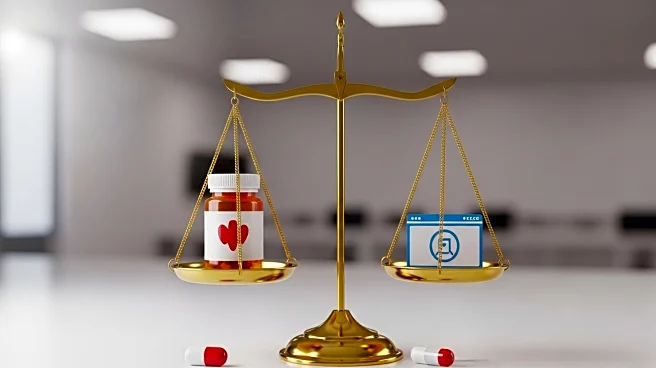What's Happening?
President Donald Trump announced a significant agreement with Pfizer to lower U.S. drug prices and invest $70 billion in U.S. manufacturing. This announcement was made during a White House press conference with Pfizer CEO Albert Bourla. The Trump administration also introduced 'Trump RX,' a new website designed to allow U.S. patients to purchase pharmaceutical drugs at reduced prices. The initiative is part of the administration's 'Most-Favored-Nation' pricing model, which aims to align U.S. drug prices with those in other wealthy nations. The website will offer drugs at a 'deep discount,' with some products like Eucrisa and Zavzpret available at 80% and 50% discounts, respectively.
Why It's Important?
This development is significant as it addresses the long-standing issue of high drug prices in the U.S., which have been a burden on consumers and the healthcare system. By reducing prices and providing a direct purchasing platform, the initiative could potentially lower healthcare costs for Americans. The deal also represents a strategic move to boost domestic manufacturing, which could have positive economic implications. However, the lack of clarity on the operational details of the Trump RX website and the potential financial benefits for President Trump have raised questions and criticisms.
What's Next?
The Trump administration is expected to provide further details on the Trump RX website's operation and its impact on the pharmaceutical market. Stakeholders, including pharmaceutical companies and healthcare providers, will likely monitor the implementation of the 'Most-Favored-Nation' pricing model closely. The initiative may face scrutiny from political leaders and consumer advocacy groups, who will be interested in its effectiveness and transparency.
Beyond the Headlines
The introduction of the Trump RX website could disrupt traditional pharmaceutical distribution channels, potentially affecting pharmacy benefit managers and retail pharmacies. The initiative also highlights the ongoing debate over the role of government in regulating drug prices and the influence of pharmaceutical companies in shaping healthcare policy.












